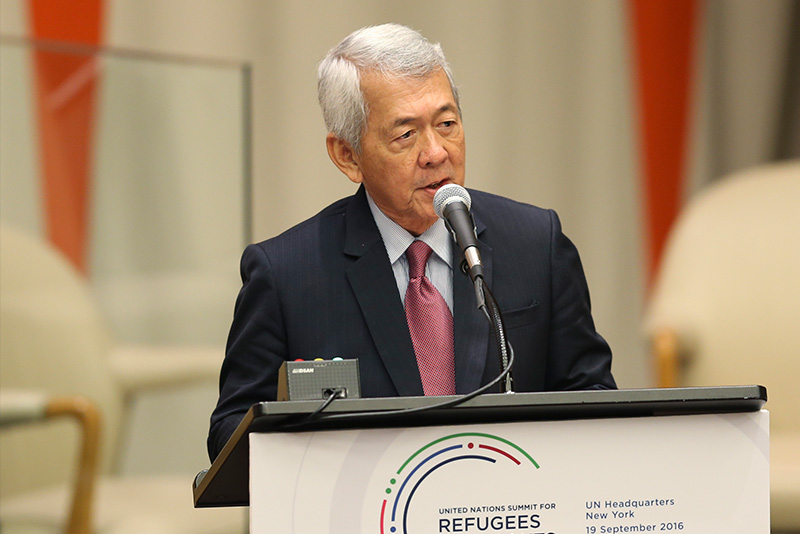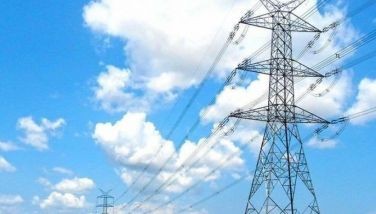Phl won’t stop China action on reefs

Foreign Affairs Secretary Perfecto Yasay Jr. reiterated the US, which is pushing for freedom of navigation within the disputed waters, and other countries such as Japan and the European Union, can separately deal with China regarding the presence of military weapons on the structures they built in the South China Sea. AP
SINGAPORE – The Philippines will not stop China from building military structures on disputed islands in the South China Sea, Foreign Affairs Secretary Perfecto Yasay Jr. said yesterday.
“We cannot, we cannot stop China at this point in time and saying ‘do not put that up’ – we will continue to pursue peaceful means at which all of this can be prevented,” Yasay said at a press briefing on the sidelines of President Duterte’s state visit here.
Yasay reiterated the US, which is pushing for freedom of navigation within the disputed waters, and other countries such as Japan and the European Union, can separately deal with China regarding the presence of military weapons on the structures they built in the South China Sea.
“There are other countries that will have special concerns insofar as these activities of China are concerned. Such as… the right to the freedom of navigation that they would like to protect and overflight operations – the United States is concerned about this, Japan is concerned about this, the European Union is concerned about this,” Yasay said.
“Let them take whatever action is necessary in the pursuit of their national interest… and we will leave it at that, for the Philippines, we have our bilateral engagements with China,” he said, stressing Duterte’s shift to an independent foreign policy.
Yasay said the Philippines would neither call nor issue a note verbale on the matter to avoid ruffling the current steady bilateral relations between Beijing and Manila.
“We want to make sure that there will be no further actions that will heighten the tensions between the two countries, particularly in the Scarborough Shoal,” he said.
The Philippines, however, stands by the decision of the UN arbitration tribunal that awarded certain portions of the disputed reefs under its exclusive economic zone, he said.
“The issue about the militarization and the construction of permanent facilities by China, insofar as the disputed territory with the Philippines is concerned, which we consider as part of our exclusive economic zone, has already been passed upon by the arbitral tribunal and decision there is very clear,” Yasay explained.
“And on that basis, in fact, we will move forward in the future insofar as pursuing the enforcement of the decision of the arbitral tribune on the basis of the findings and conclusions,” he added.
“... there is nothing that we can do about that now, whether or not it is being done for purposes of further militarizing these facilities that they have put up.”
Duterte’s decision to pivot to China has had positive impact in the country – which recently approved a treaty allowing Philippines’ membership with the China-led Asian Infrastructure Investment Bank, Yasay pointed out.
He noted Filipino fishermen can now fish in the Panatag (Scarborough) Shoal area – in stark contrast to the previous administration which questioned Beijing’s flexing of muscles in the region.
“And our efforts had paid off. As you can see, our fishermen are allowed to... not allowed – but our fishermen now have free access, insofar as Scarborough Shoal is concerned,” Yasay said.
“And we will continue to engage China insofar as the other aspects of our relationship is concerned – trade, investment, people-to-people contact, cooperation, infrastructure development and other such assistance that will have no strings attached,” he said.
“We felt that this is necessary also as part of a confidence building measure so that we can later on go back into the issue of our dispute with the South China Sea, through peaceful resolution.”
The arbitration ruling has been temporarily set aside to ensure the good relations we now have with China, he said.
“In the meantime, we have placed at the back burner without compromising our rights as declared by the arbitral tribunal insofar its decision of July 12, 2016 is concerned,” Yasay said.
Down the line, the Philippine Coast Guard is holding a two-day bilateral meeting that started yesterday with its counterpart in Beijing to propose a communication hotline for search and rescue missions.
Once a hotline number is created, the PCG would be able to save precious time on search and rescue operations, particularly in the disputed maritime areas in the South China Sea.
The two coast guard agencies could dispense with the need to course their request through their embassies and directly relay this to their counterpart coast guard.
A matter of time
Even with the improved relations between the Philippines and China, it is only a matter of time before Beijing pushes the envelope to assert once again its massive maritime and sovereignty claims in the South China Sea, the Washington-based Center for Strategic International Studies (CSIS) said.
China’s behavior in the South China Sea has been relatively restrained since the ruling against it in July by an international court, only or perhaps because President Duterte has decided to shelve the ruling in the hope he can achieve some economic deals with Beijing.
“But it is likely only a matter of time before China pushes the envelope once more,” CSIS fellows for Southeast Asia Program, Murray Hiebert and Geoffrey Hartman said in a paper published Thursday.
Murray and Hartman cited China’s ongoing constructions of military facilities on all seven artificial islands it currently occupies in the Spratlys archipelago.
Aside from China, which claims the entire disputed region as an integral part of its maritime and territorial domain, the Philippines, Vietnam, Malaysia, Taiwan and Brunei have also overlapping claims over the area.
“China’s ongoing construction of military facilities in the Spratly islands is increasing its advantage over smaller (claimant) neighbors, who will continue to look for the United States for backing and assistance,” the two CSIS fellows said.
Recent satellite photos released by Asia Maritime Transparency Initiative (AMTI), a US think tank also affiliated with CSIS, showed China has “weaponized” all its seven artificial islands out of their formerly occupied reefs – Fiery Cross (Kagitingan), Mischief (Panganiban), Subi (Zamora), Gaven (Burgos), Hughes (Kennan), Johnson South (Mabini) and Cuarteron (Calderon).
Party-list group Bayan Muna denounced China’s reported installation of weapons systems in the disputed islands.
“This is highly deplorable as it further militarizes an already militarized maritime zone. It raises the stakes for a potential regional dispute as US president-elect Donald Trump claimed he is ready to confront Beijing on territorial and freedom of navigation issues,” Rep. Carlos Zarate said. – Jaime Laude, Jess Diaz, Evelyn Macairan
- Latest
- Trending



























